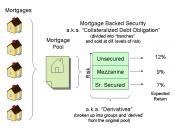INTRODUCTION What does MORTGAGE mean? In the word mortgage, the mort- is from the Latin word for death and -gage is from the sense of that word meaning a pledge to forfeit something of value if a debt is not repaid. So mortgage is literally a dead pledge. It was dead for two reasons, the property was forfeit or "dead" to the borrower if the loan were not repaid and the pledge itself was dead if the loan was repaid. In the words of the 17th century English jurist (and apparently etymologist) Edward Coke: "It seemeth that the cause why it is called mortgage is, for that it is doubtful whether the Feoffor will pay at the day limited such summe or not, if he doth not pay, then the Land which is put in pledge vpon condition for the payment of the money, is taken from him for euer, and so dead to him vpon condition.
And if he doth pay the money, then the pledge is dead as to the Tenant" The word is 14th century in origin.
A mortgage (Law French for "dead pledge") is a device used to create a lien on real estate by contract. It is used as a method by which individuals or businesses can buy residential or commercial property without paying the full value upfront. The borrower (also called the (mortgagor) uses a mortgage to pledge real property to the lender (also called the mortgagee) as security against the debt (also called hypothecation) for the rest of the value of the property....
Mortgage is a debt instrument by which the borrower (mortgagor) gives the lender (mortgagee) a lien on property as security for the repayment of a loan.
Transfer of property act 1882, deals with mortgage. (Secs 58 to 98) INDIAN BARE...


